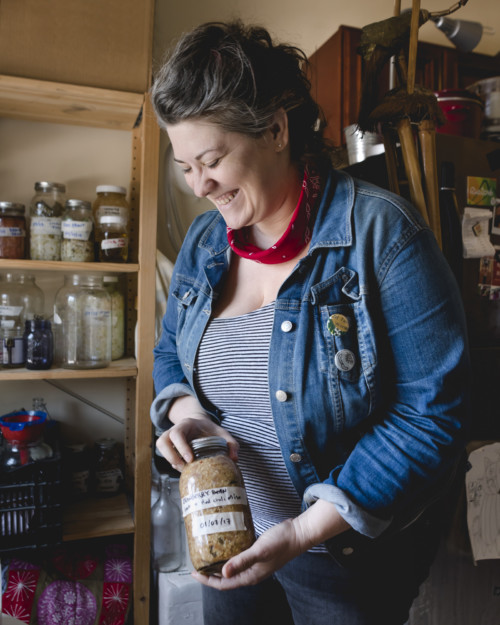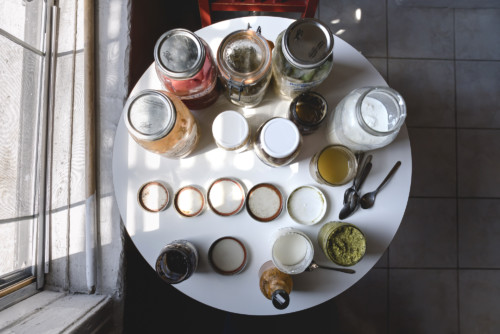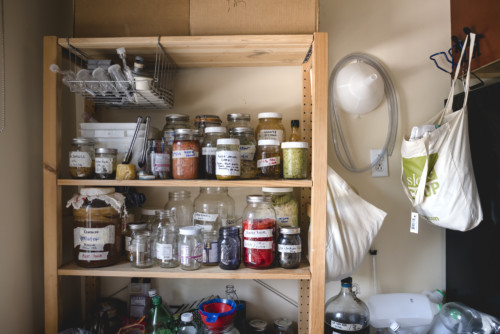
Contraband Ferments Wants You To Trust Your Gut
In the past year, gut health and probiotics have become some of the buzziest words in health and wellness, as the beauty and food worlds both rush to capitalize on its numerous health benefits. Yet the word “fermentation”– at least in the culture of the American diet– still seems to carry with it associations of something done in a dark, pungent room, always tasting faintly of apple cider vinegar, or of something you might have accidentally caused in the back of your refrigerator. (Please, go throw it away right now.)
Earlier this spring, Cheryl Paswater welcomed us to her neat, cleverly styled apartment in Brooklyn– which would make the perfect snapshot for anyone’s Pinterest board, and is a far cry from from any accidental science experiments or hippie dungeons. An artist and former punk rocker, Paswater runs Contraband Ferments, part start-up fermentation company, part health coaching, part educational resource.
“I like to describe Contraband Ferments as more a project, purely because my fermentation CSA is run more like a food club,” Paswater explains. “I’m a little bit like a drug dealer in the sense that friends will text me and be like, ‘What do you have right now? I’m comin by.’ I hand them a wad of stuff, they had me a wad of cash.”
At the moment– in between consulting with clients and organizing fermentation meet-ups– Paswater is negotiating a book deal on fermentation, with recipes like turkey miso meatloaf and fermented fried chicken with chickpea dosa waffles. Below, she catches us up on everything you need to know about creatively fermenting at home– no hippie robes required.
Fermentation Can Be A Life Saver (Literally)
For most of her life, Paswater had been in poor health,constantly plagued by colds, bronchitis, sinus infections, asthma– even contracting shingles in her early 20s. Shortly after completing her dual masters at Pratt in painting and art history, Paswater’s body completely crashed.
“I had this wakeup call that I was going to die before my 30th birthday,” Paswater recalls. “I used to play in a punk band and I went and sold all of my music gear at a pawn shop, walked in to the office of the holistic practitioner I’d been talking to, put a wad of cash on her table, and said, ‘I will do whatever you tell me to do. I’m going to die.'”
An increasingly familiar story, the traditional medicine of the Western world had altogether failed Paswater. “‘You’re allergic to your cat.’ ‘Take this steroids.’ ‘Have some antibiotics,'” relates Paswater of the advice she was given. “I was on so many antibiotics, I totally destroyed my gut.”
With the help of an herbal practitioner, Paswater discovered she had Epstein Barr, Hashimodo, and a thyroid condition, and decided to undertake a whole food diet.
“In the process, I started getting interested in fermentation,” Paswater continues. “I had this epiphany that every culture in the food eats these foods but us, and we’re the sickest.”

Let Go of Your Fears & Apprehensions
According to Paswater, the biggest challenge around fermentation is getting people to overcome the initial and trust themselves.
“When people ask me what I do, I say I teach fermentation,” Paswater reflects. “I teach a little a bit of the science, a little bit of process, and then safety, but what I really end up doing is teaching intuition. I do hand students recipes but I say, ‘You don’t have to follow this.’ I try to really teach this isn’t finite. Go with instincts. Play with it. Be creative.”
Start Simple But Don’t Be Afraid To Shake It Up
“I’m really into simplicity,” Paswater says. “You really just need a jar, produce, salt, and maybe some water. Or a jar, water, sugar, tea, or herbs.”
According to Paswater, the easiest ferment to start with is sauerkraut (you can check out her recipe smoked sauerkraut recipe here) but more than anything, Paswater emphasizes not being afraid to branch out.
“Our guts and biomes are made to be diversified,” Paswater reminds. “What we’re starting to find is strains of bacteria are going extinct in people’s bodies due to lack of interaction. We’re not digging in the soil, we’re not running around barefoot… Diversity is good. Eat lots of different kinds of ferments. Different food comes out of different soil and that soil changes what grows in that product.”
What You Should & Shouldn’t Be Worried About
First thing’s first: “Botulism doesn’t exist in fermentation,” Paswater tells us. “It exists in canning but not exist in actual fermentation.”
“Just because it has mold on it, doesn’t mean it’s bad. That’s a big misconception,” Paswater continues. “I get a lot pictures of people’s kombucha scobies. ‘It has a bubble!’ You’ll be fine. ‘It’s got a brown spot!’ As long as it’s not turning black or has mold, you’re cool.”
Paswater’s rule of thumb is that if there’s anything red, black, and neon is bad, dump everything immediately and give the container a good wash. Likewise, if there are maggots in your scoby, dump it. (Ah, the wonders of fruit flies.)
In general, Paswater advises: “Fermentation will tell you when something is not right. It’s going to give you signs– just like it gives you signs that it is ready.”
Are Commercial Ferments Worth It?
If you’re not up to making your own ferments quite yet, there are good commercial fermentation companies out there. Paswater recommends companies like Farmhouse Culture or the Brinery.
“Look for words like ‘live’, ‘probiotics’, ‘raw’– check the ingredients. It’s always going to be refrigerated. They should be pretty pure. Most commercial yogurts are made with lab-grown probiotic strains versus making your own. I think White Moustache and Anita’s Coconut Yogurt are making good stuff,” Paswater adds. Just like heirloom varieties of produce, Paswater explains, “It’s the difference between lab-cultivated and wild bacterias.”
Hot Trends In Fermentation
In recent months, Paswater has seen a huge spike in interest around koji, a mold-infused rice that you can use for fermenting other things, like miso, which can also be used to cure meat.
One of her favorite products (and one of her most popular among friends) is fire cider, a powerful concoction of horseradish root, ginger root, turmeric root, garlic, onions, lemon, thyme, oregano, hot peppers, salt, fermented for six weeks in apple cider vinegar and then infused with a touch of honey. “It’s considered a tonic to get the sinuses stimulated, and it’s a huge immunity booster,” Paswater explains.
In general, Contraband Ferments echoes a larger trend in lifestyle. Like Botanarchy and Weedy Resistance, there is a sense of rebellion against the way things are, an upheaval that engenders a return to nature, to what is natural and innate.
“I liked the idea of a little bit of ‘fuck the man’, probably because I’m a former punk rocker,” Paswater laughs. “We have medicine– medicine is an amazing thing when we need it, antibiotics serve a purpose, and they can be life-saving. But all these other things are amazing, too. We’ve just gotten so far from intuition. Bring back the old world, ancient traditions, herbal medicine…We can problem solve a lot of our own stuff if we just know how to listen to ourselves.”
To learn more about Contraband Ferments, visit their website.




































